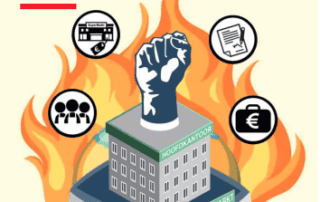Column Franchise+ – 50 percent more franchise lawsuits
The Legal Franchise Statistics 2018 published by Ludwig & Van Dam attorneys show that there is an increase of 50% in the number of judgments in court cases rendered in 2017 compared to 2016 (47 in 2017 and 32 in 2016).
The Legal Franchise Statistics have been compiled for 10 years on the basis of all published judgments of judges. This study includes all figures and trends up to and including 2017 and a number of interesting trends can be deduced.
“Especially in the run-up to franchise legislation, it is important that one bases oneself on figures and trends in franchise conflicts and not just on statements by interest groups and statements in the media,” says Jeroen Sterk, of Ludwig & Van Dam attorneys.
“It is remarkable how little attention has so far been shown in politics regarding any investigation into the actual nature and extent of franchise disputes. No reference to independent empirical research can be found in any of the documents published so far by the sector and/or the Ministry of Economic Affairs. The substantiation of the need for legislation and its content has so far been left to the industry itself, which is also not usual. This is all the more remarkable where there is an intention to intervene in trade relations between private parties. However dependent the franchisee may be, the question still remains how the balance can best be safeguarded and where existing legislation would fall short. Incidentally, this does not mean that government intervention is not necessary in a vertical business relationship that has characteristics and parallels with other named agreements, such as an employment and agency agreement. However, it would have been obvious to substantiate that intervention and the way in which it should take place with a further analysis based, among other things, on the existing case law.”
For all statistics, graphic explanations and the full account, please visit www.ludwigvandam.nl.
Number of franchise disputes
The study shows that the trend that occurred from 2013 to 2014 in terms of the increase in published judgments in franchise cases continues. In 2016 and 2017, 32 and 47 final judgments were published respectively, compared to an average of 16 in the years 2008 to 2013, the period prior to the franchise debate. To put things in perspective, the study notes that the industry in the Netherlands had 30,914 franchisees in 2016*.
Other Disputes
“It is somewhat difficult to estimate the number of unpublished judgments. However, because various cases were surrounded with the necessary publicity, we can, partly drawing on our own practical scope and experience, as well as frequent consultations with many colleagues in various professional forums, say that these cannot be many statements. Special thanks are given to those colleagues who have provided statements and other information for the franchise statistics. It should be noted, however, that there is an increase in collective issues, which were considered as one case in this statistic,” says Jeroen Sterk.
“In addition, it is our experience that most cases are settled out of court or are settled during proceedings. Incidentally, it should be noted that this is sometimes stimulated by mandatory arbitration or other private legal proceedings included in some franchise agreements, which prove to be an impassable barrier in terms of costs. Then there is the category of franchisees and franchisors (because they exist) who are not supported or helped for various reasons. The cause of this can often be traced back to the lack of legal expenses insurance and/or an (overly) dependent position. There is an unpublished estimate of the number of other related disputes,” explains Jeroen Sterk.
Subjects of Dispute
Chart 2 (see ludwigvandam.nl) shows that disputes about clauses in the agreement (often non-compete clauses), forecasts and termination of the franchise agreement are the most common. This could be an indication to regulate precisely for those subjects. It should of course be noted that the Acquisition Fraud Act, which was introduced in 2016 and, according to the Minister of Economic Affairs, also applies to franchise relationships, already provides some legal regulation for prognostic disputes. In the meantime, in 2017, one court has also ruled in a case handled by Ludwig & Van Dam application of the aforementioned law in a franchise dispute. This law provides the franchisee with considerable relief in the often difficult burden of proof due to a lack of knowledge.
In any case, it can be numerically deduced from the nature and subjects of the published and other disputes that having and maintaining a good franchise agreement can prevent many disputes. With regard to forecasts, it is recommended that both franchisee and franchisor, as well as possibly involved third parties, take a more careful approach to drawing up and assessing them in the pre-contractual phase.
Finally, as a trend, with reference to table 3 (see ludwigvandam.nl), it can also be observed that the ratio of wins versus losses between franchisor and franchisee if litigation has taken place since the start of the franchise debate a few years ago, from cases won in majority by franchisees to in majority (partly) won by franchisors.
Legislation and what will it entail?
“Whether all this is reason to come to legislation and what it should entail is not up to the drafters of this one, (too) much has already been written about that. The interpretation of the figures is also up to those who supervise the legislative process or have any role in it. We would advise them to become acquainted with the underlying judgments and their actual background,” concludes Jeroen Sterk.

Other messages
Post non-competition ban without a signed franchise agreement
Is a franchisee bound by a post-competition ban without a ...
Post non-compete clause in hard franchising
The summary proceedings judge of the Amsterdam District Court ...
Does an agreed rent indexation always apply?
Many entrepreneurs were confronted with a significant rent increase ...
Ludwig & Van Dam in Distrifood Magazine about the Franchise Act
Interview about the current obstacles for independent supermarket entrepreneurs and ...
No franchise agreement, but membership of a cooperative
In certain cases, agreements made in a franchise agreement may ...
Post prohibition of competition and transfer of the business to the life partner
A franchisee is a company. The franchisee and the private ...







